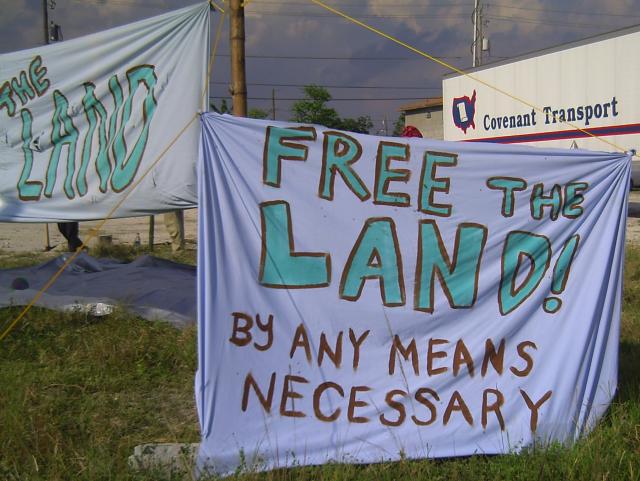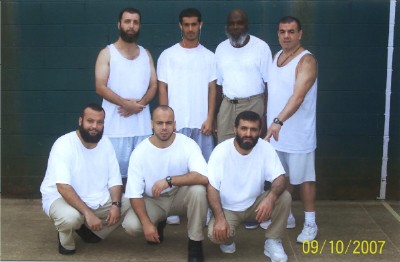Audio Player
Podcast: Play in new window | Download
Updates:
- Fingerprint Scans for UK Students
- FBI Tracks Down Those Who Travel To Cuba
- Pope Benedict Ratzinger Accused of Covering Up Molestation Case of 200 Deaf Children
—–
Take Back The Land and The Center For Constitutional Rights Delegation To South Africa
The national movement, Take Back the Land has demanded housing for the homeless in Miami, New York City and is in South Africa to engage in anti-eviction and land reform work. Lawyers with the Center for Constitutional Rights will also join Take Back the Land and provide legal support to the social justice movements. The two groups will be in Cape Town with the Anti-Eviction Campaign and 3 days in Durban with Abahlali bs Mjondolo or (ABM). Among the core beliefs of this project called the Center for Pan African Development are, land is an essential element of liberation, the black community must collectively control land in the black community and the path to liberation is pave through self-determination, not the accommodation of those in power.
- The history of Apartheid is so connected to land and redistribution of land. We spent a few days in Cape Town with the Anti-Eviction Campaign. We traveled to Durban and visited with ABM there. Throughout the trip activists and community members had shared stories of displacement and mass evictions at the government’s hands, without any redress. We have a lot to learn from the movement in South Africa.
- In the United States, we can’t think beyond the private ownership of land.
- Housing is not a constitutionally protected right. Where we can gain from international human rights law, we need to infuse that into our work. The Universal Declaration of Human Rights, recognizes housing as a human right.
- South African Constitution states in articles 26 and 33 affording one house for one family.
Guest – CCR staff attorney, Sunita Patel is involved with racial profiling, immigrant rights and other human rights litigation. Prior to her position at CCR, she held a Soros Justice Fellowship at The Legal Aid Society, Immigration Law Unit in New York where she represented immigrant detainees in removal proceedings and worked with criminal justice and human rights groups to create independent community oversight for detention operations through public accountability boards.
CCR Challenges Experimental Prison Units that Restrict Communication
The Center for Constitutional Rights filed a lawsuit challenging violations of fundamental constitutional rights, including the right to due process, at two experimental federal prison units called “Communications Management Units” (CMUs). The units are being used overwhelmingly to hold Muslim prisoners and prisoners with unpopular political beliefs.
CCR filed Aref v. Holder in the D.C. District Court on behalf of five current and former prisoners of the units in Terre Haute, IN and Marion, IL; two other plaintiffs are the spouses of prisoners. The CMUs were secretly opened under the Bush administration in 2006 and 2007 respectively and were designed to monitor and control the communications of certain prisoners and to isolate them from other prisoners and the outside world. More about Aref
- It’s the first time we’ve seen units like this in the federal system. The Bureau of Prisons secretly created these prisons in 2006 and 2007 under the Bush Administration.
- The bureau of prisons initially offered a public comment period and were flooded with comments of what a bad idea this is. They withdrew the public comment and continued to build the prison in secret.
- There’s no meaningful process at all as to who should be put in this unit.
- The Bureau of Prisons has published very broad criteria about the types of individuals, it thinks belongs there.
- The criteria is so broad it could encompass tens of thousands of prisoners.
- When we look at who is being sent the unit, it’s mostly Middle Eastern Muslims, African Americans who have converted to Islam in prison, and also a lot of people with unpopular political views.
- One of our clients Daniel McGowan, is an environmental activist who is serving a term in prison. He never violated a prison rule, he was a low security prison for the first part of his sentence, and then without any reason, he is moved to this highly restricted unit.
- The CMU is an experiment in social isolation. Very few opportunities for visits. Uniquely cruel for individuals who have to undergo it.
- Bad public policy, these individuals are going to be released at some point.
- We are seeking to challenge the extreme limitations on their phone calls and visits.
- Most inmates get 300 minutes a month of phone calls, my clients for years had only one 15 minute call a week.
- For prisoners with large families, this is incredibly difficult. It seems to me this is truly about silencing advocacy from inside the prison.
- Some of our clients including Mr Aref were convicted on terrorism related charges, in his case material support.
- When prisons move prisoners into the CMU of extremely restricted confinement without any process or explanation, of course leads to putting prisoners in the CMU for discriminatory or retaliatory reasons.
Guest – Rachel Meeropol has worked at the Center for Constitutional Rights (CCR) since 2002. She is the co-editor and primary author of the Jailhouse Lawyers Handbook, a widely-requested resource for prisoners, and the editor of America’s Disappeared: Secret Imprisonment, Detainees, and the “War on Terror,” (Seven Stories Press, 2005).
—————–
FBI Entrapment: Personal Stories of Preemptive Prosecution
We go now to hear segments from the event titled FBI Entrapment: Personal Stories of Preemptive Prosecution sponsored by the National Lawyers Guild, Middle Eastern Law Students Association (MELSA), Islamic Law Students Association (ILSA) and Law Students for Human Rights.
Families and community members gathered in a room at NYU to discuss their cases, and how their family members were entrapped by FBI informants and agent provocateur tactics. As we have reported in the past years, the FBI have used these tactics to target Muslims and others by offering money and assets within impoverished communities. Some FBI groups target mosques and incite violent action. Most informants are felons, that have made plea-deals with the FBI. As we have seen, these stories make headlines across the country on Memorial Day or the 4th of July, meanwhile, these men implicated in the FBI stings are serving long sentences. We get an inside perspective from their families. We hear from Lynne Jackson and Attorney Stephen Downs from Project Salam. We also hear from 12 year old Lejla Duka, and her cousin, family members with the Fort Dix Five case.
Lynne Jackson / Attorney Stephen Downs
- CCR filed Aref v. Holder in the D.C. District Court
- Aref/Hossain have left behind 2 families, 10 children, ranging in ages 4-16 years old.
- What is going on with our country?
- We formed Project Salam, we need to look at all these case together, there are hundreds of cases.
- We’ve had no response at all from President Obama or Attorney General Holder
- The Cheney one percent doctrine. If there is one percent chance that a Muslim will commit a terrorist act down the road you have to take them out.
- One of the worst things you can do as Muslim is be generous. The government made good use of the material support for terrorism statute.
- Certainly from my point of view, as a lawyer I assume every conversation I have is being monitored. I think all of you should to.
- Check out prisoner database at CMU’s (PDF)
Lynne Jackson, volunteer and co-founder of Project Salam, Attorney Stephen Downs, a retired New York State attorney and a volunteer attorney for the Yassin Aref case. Listen to last year’s Law and Disorder interview.
————————————————————————–

